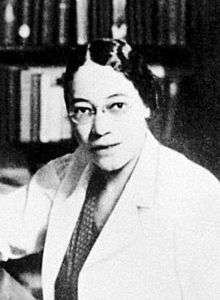Virginia M. Alexander
Virginia M. Alexander (February 4, 1899 – July 24, 1949)[2][3] was an American physician, public health researcher, and the founder of the Aspiranto Health Home in Philadelphia, Pennsylvania.
Virginia M. Alexander | |
|---|---|
 | |
| Born | February 4, 1899 Philadelphia, Pennsylvania[1] |
| Died | July 24, 1949 Philadelphia, Pennsylvania |
| Nationality | American |
| Alma mater | Woman's Medical College of Pennsylvania[1] |
| Known for | Founding the Aspiranto Health Home in Philadelphia |
| Scientific career | |
| Fields | Obstetrics and gynecology |
Early life
Virginia M. Alexander was born in Philadelphia, Pennsylvania on February 4, 1899 to Hilliard Alexander and Virginia Pace.[4] She had four siblings, including the prominent attorney Raymond Pace Alexander.[5] Alexander's mother died when she was 4 years old, and at age 13 her father's riding academy closed.[3] Alexander withdrew from school to help relieve the resulting economic strain on her family, but her father insisted that she finish her education.[6]
Education
Alexander attended high school at the William Penn High School for Girls, where she graduated with honors before receiving a scholarship that allowed her to attend the University of Pennsylvania to complete her undergraduate education.[6][3] Alexander took work as a waitress, clerk, and maid in order to cover her living expenses through college.[6] She was also a member of the black sorority Delta Sigma Theta.[7] She continued her medical education at the Women's Medical College of Pennsylvania. With the help of private philanthropy, Alexander finished medical school in good standing.[6]
When Alexander began looking for a medical internship, she faced rejection from many Philadelphia hospitals on the basis of race.[6] The hospital operated by the Women's Medical College of Pennsylvania would also not accept her, but the school did help Alexander and another student, Mae McCarroll, secure internships at the Kansas City Colored Hospital in Missouri in 1925.[3] Alexander remained in Kansas City to complete a pediatrics-surgery residency at Wheatley-Provident Hospital.[3]
Career
In 1927, Alexander returned to Philadelphia. She was passionate about public health but pursued clinical practice out of financial necessity.[3]
Aspiranto Health Home
Alexander founded the Aspiranto Health Home in her renovated house in 1930.[3] Aspiranto provided "socialized" health services to African American community members in North Philadelphia.[3] Her work in private practice helped to fund Alexander's charitable medical care. Services provided by Aspiranto, often free of cost, included general medical care, obstetric care, and emergency medical care.[3] Alexander's colleague Helen Octavia Dickens was also an active practitioner at the house.[6]
Community involvement and activism
Alexander was active in a variety of different social, professional, and academic organizations. She practiced medicine at Frederick Douglass Memorial Hospital and Nurses' Training School, the Hospital of Women's Medical College of Pennsylvania, Pennsylvania Hospital, and performed administrative work at Convalescent Hospital.[6]
In 1931, Alexander officially became a Quaker. She would go on to use her position in white Quaker circles to push her cause of improved public health practice for African American patients.[3]
In her community, Alexander was active on the board of Wharton Settlement, the Young Women’s Christian Association, the Women's International League for Peace and Freedom, and the Religious Society of Friends, where she was active in the Race Relations Committee, the Institute of Race Relations, and the Young Friends Movement.[2] She began formal study of public health disparities for black and white patients in Philadelphia in 1935 as part of her involvement with the Institute of Race Relations (see "Publications").[3]
Public health career
Alexander was admitted to Yale University in 1936 to study public health, but had to leave in 1937 due to troubles with her lupus.[3] Shortly after leaving Yale, she accepted a position at Howard University as an assistant university physician for women students.[3] In 1939, she supervised a public health project at Howard that would eventually lead to her obtaining her master's degree in public health from Yale.[3]
Alexander worked with the US Public Health Service from 1943 to 1945 at the Slossfield Clinic located in Birmingham, Alabama. Afterwards, she returned to Philadelphia where she resumed her medical practice in addition to working with local Quakers on race relations.[3]
Alexander died on July 24, 1949 after years battling lupus.[3]
Publications
- The Social, Economic, and Health Problems of North Philadelphia Negroes and Their Relationship to a Proposed Interracial Public Health Demonstration Center, 1935.
- Negro Hospitalization, 1937.
- The Health Status and Needs of the Negro Adolescent, 1940.
- The Health Status of Negro Workers in the National Youth Administration in the District of Columbia, 1941.
References
- "Dr. Virginia M. Alexander". Biography. National Library of Medicine. Retrieved May 29, 2013.
- Spurgeon Johnson, Charles (2012) [1936]. A Preface to Racial Understanding. Friendship Press. pp. 126–130. ISBN 978-1258308735.
- Gamble, Vanessa Northington (August 2016). ""Outstanding Services to Negro Health": Dr. Dorothy Boulding Ferebee, Dr. Virginia M. Alexander, and Black Women Physicians' Public Health Activism". American Journal of Public Health. 106 (8): 1397–1404. doi:10.2105/AJPH.2016.303252. ISSN 1541-0048. PMC 4940657. PMID 27310348.
- Gamble, Vanessa Northington (August 2016). ""Outstanding Services to Negro Health": Dr. Dorothy Boulding Ferebee, Dr. Virginia M. Alexander, and Black Women Physicians' Public Health Activism". American Journal of Public Health. 106 (8): 1397–1404. doi:10.2105/AJPH.2016.303252. ISSN 1541-0048. PMC 4940657. PMID 27310348.
- "Dr. Virginia M. Alexander". Biography. National Library of Medicine. Retrieved May 29, 2013.
- "Dr. Virginia M. Alexander". Changing the Face of Medicine. June 3, 2015. Retrieved November 28, 2017.
- Sharon Harley; Black Women and Work Collective (2002). Sister Circle: Black Women and Work. Rutgers University Press. p. 172. ISBN 978-0-8135-3061-1.